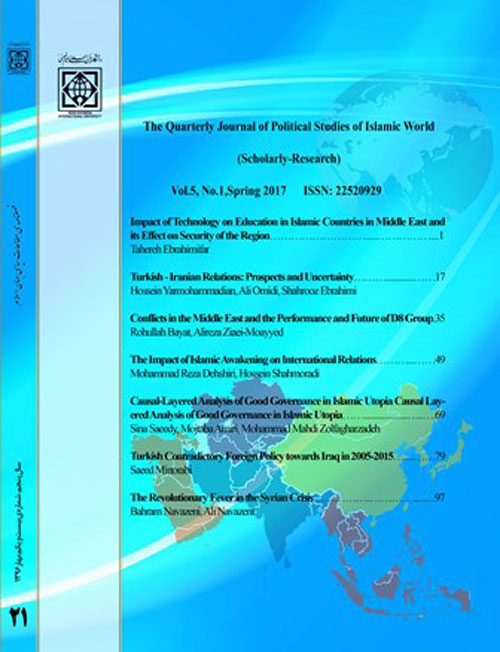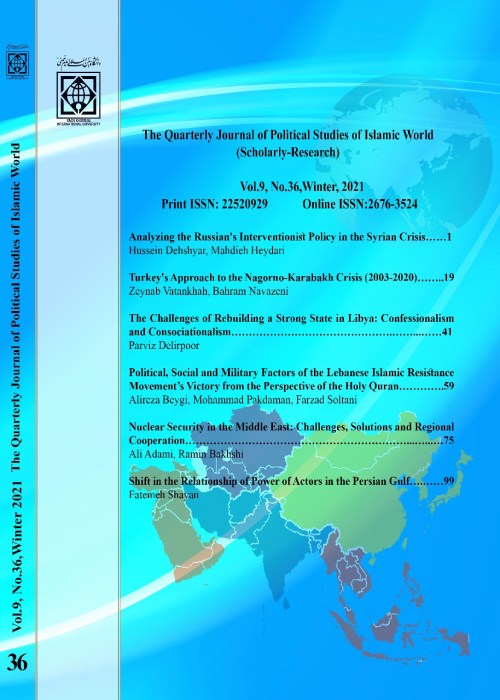فهرست مطالب

نشریه مطالعات سیاسی جهان اسلام
پیاپی 21 (بهار 1396)
- تاریخ انتشار: 1396/03/11
- تعداد عناوین: 7
-
-
Pages 1-16Technology is inherently neutral and can be used in equal measure for good or evil. Interestingly, this determination is a matter of perspective. Technology enables or enhances a number of activities. Fundamentally, technology can be used to improve teaching and learning, to make administrative operations more efficient and effective, to help discover knowledge and to help improve access to information. The problem, of course, is how these things relate to the role of humans. While traditionalists may contend that technology detracts from the essence of humanism, there is abundant evidence to show that todays students are doing quite well, as both learners and as people. A fundamentally important issue today involves a dichotomy concerning whether it is the inputs or the outputs that determine the effectiveness of institutions. Although education is timelier and its impacts are gradual, it is far too often underplayed when it comes to a nations security by the size of military and present economic growth. Education has never been more central to the security of Middle East countries.Keywords: Middle-East, Education, Technology, Security, online learning
-
Pages 17-33Iran and Turkey are two key regional actors that separately play a role in multiple geographies in terms of both geographical weight and tenets of identity. Geographically speaking, these two countries are simultaneously influential in political-security issues in different areas such as the Fertile Crescent. When it comes to identity, by making a link between their principles and values to regional issues, especially guiding ideological movements and non-state actors, Iran and Turkey try to influence the strategic areas. In fact, these two actors seek the point at which their national interests are met in the interconnection of these two aspects of regional policy. Accordingly, instability has become the main character of their bilateral relations. The objective of the present paper is to study the scope and the way various variables are applied by Turkey and Iran in the region and in their relations with each other. Hence, the main question of this article is what issues do the factors affecting the relations between Iran and Turkey concern about and how much is the sphere of influence of these variables? In this regard, it will be discussed that their future relations would be influenced, more than anything else, by the value-ideological issues, the balance of power, and their regional roles whose scope and dimensions are determined by the interaction with other regional and international actors.Keywords: Iran, Turkey, The Middle East, Arabic uprisings, Syria, Iraq, Coup
-
Pages 35-48About 20 years ago Necmettin Erbakan, the former Turkish Prime Minister, introduced his idea about the establishing of an Islamic group of developing countries, with a large Muslim population and a high economic potential, to cooperate in economic and trade activities.
Using the shift share technique in a trade model, the current paper discusses possible opportunities as well as easing the relations among the D8 group. The results show that that there are serious problems to expand trade and economic relations among the D8 members and then the shaping of a fit community in reality. While the group was formed to make an economic development alliance, fostering economic and commercial cooperation among the member nations, figures show that during last decades the members of this group have had very low bilateral and multilateral relations in economic and commercial affairs. This problem has been mainly rooted in economic and political divergences among the members. Indeed, the political problems between important members of the D8, including; Egypt, Iran and Turkey, have played an essential role in this result. Beyond doubt, the future of the D8 group directly depends on the strategic plans. and action policies of these core countries with triangle cooperation purposes. However, unfortunately due to the old rooted political divergences in the Middle East together with the recent conflicts and crises in this area the future of D8 group is extremely ambiguous.Keywords: Developing Eight (D8) Group, Future, Political Divergence, Economical Integration, Export Opportunity, Import Opportunity, Shift-Share Technique -
Pages 49-68Before the Islamic Awakening, the international system was the main shaping factor for the regional trends of Western Asia (Middle East). But after the political developments known as the Islamic Awakening or the Arab Spring, and the entry of new elements such as people and public opinion in the political equitation of the region, the regional trends of Western Asia has become more influential in the international arena. In a way that after these developments, the formation of Global Awakening known as Occupy Wall Street Movement is considerable. Therefore, the question of this paper is to determine how Islamic Awakening has affected international relations. In this regard, the issue would be discussed from the perspective of Structure and Agent. In this way, the impacts of Islamic Awakening developments on the structure and functions of the international system would be reviewed.In this way, the impacts of Islamic Awakening developments on the structure and functions of the international system would be reviewed.Keywords: Islamic Awakening, Public Opinion, People, Wall Street, Western Asia, Social Networks, Arab Spring
-
Pages 69-78Since ancient times, humankind has aspired to create an ideal society and live in an environment free of problems and difficulties, a utopia with high levels of excellence, bringing him happiness and satisfaction. Great western philosophers and eminent oriental sages have articulated their ideas and revealed their dreams about the characteristics of people and traits of governors of such ideal places.
Nowadays, governance is considered the main custodian of the social order and responsible for the comfort and satisfaction of citizens; so that bad governance is being increasingly regarded as one of the root causes of all evil within our societies while good governance is deemed the origin of public prosperity. Recently, some international institutions such as the UN and the World Bank and also several scholars have presented various definitions, models and theories about the concept of good governance and its attributes.
The present study makes an attempt to employ a new approach to explore the requirements of good governance in the religious perspective of Ali ibn Abi Talib as the first Imam of Shia muslims. Therefore, the causal layered analysis (CLA) as a futuristic method has been applied to investigate letter 53 of the Nahj al-Balagha containing his orders to Malik al-Ashtar and finally the results have been presented and discussed at different analysis levels.Keywords: Good governance, Islamic Utopia, CLA -
Pages 79-95One of most sensitive relationships in the Middle East is that between Turkey and Iraq. Crucial in Turkeys relationship with Iraq is its view of Iraqi Kurdistan. This article studies the development of the Turkish foreign policy towards Iraqi Central and Kurdistan Regional Government ( KRG) in 2005-2015. The article analyzes several dimensions of Turkeys foreign policy towards Iraqi Central Government and KRG. Many observers have stressed on contradictory nature of Turkeys foreign policy towards Iraq in post-2003 era. So the main question of this article is why there has not been a coherent approach in Turkish foreign policy towards central government of Baghdad and regional government of Erbil in 2005-2015? The answer of the article as its hypothesis is failing nature of Iraq central government and the vast oil resources in Kurdistan region have encouraged a pragmatic and ups and down relations between Ankara, Baghdad and Erbil in 2005-2015 which could be characterized by deep contradictories in economic and security goals. The article shows that Ankara increasing relations with KRG is a reflection of Turkish limits of influence in Iraq and in the region as a whole.Keywords: Turkey, foreign policy, Iraq, Kurdistan Regional Government, Change
-
Pages 97-112By studying the internal factors of the 2011 crisis in Syria, this article aims to describe causes led to the spontaneity of a part of Syrias people in fighting against tyranny, and the attempt to change the political system. Investigation of Syrias crisis indicates the tyranny which naturally and inevitably, has prepared the opportunity for the revolution to occur, and has resulted in the conversion of public hatred into a revolution. Based on Crane Brintons findings in the book The Anatomy of Revolution, it seems that Syrias crisis is almost consistent and uniformed like the pattern of four revolution which Brinton studied. Symptoms such as: existence of a tyranny and its inability to suppress revolutionaries severely and completely, and also the prevalence of the notions like idealism and liberalism among revolutionaries, which had a fundamental role in providing necessary and sufficient objective and subjective aspects for the revolution, are also observed in Syrias crisis. While investigating the internal factors of the crisis, this article tries to describe the symptoms of revolutionary fever which has resulted into this crisis.
Focus on these issues and through descriptive and analytical methods, the article has utilized library resources, news sites, newspapers and field sources through interviews with Syrian students in Iran and cognizant people.Keywords: crisis, Syria, Legitimacy, Bashar Assad, Revolution


